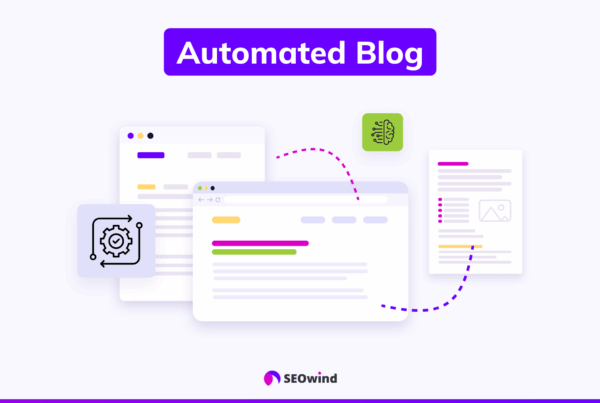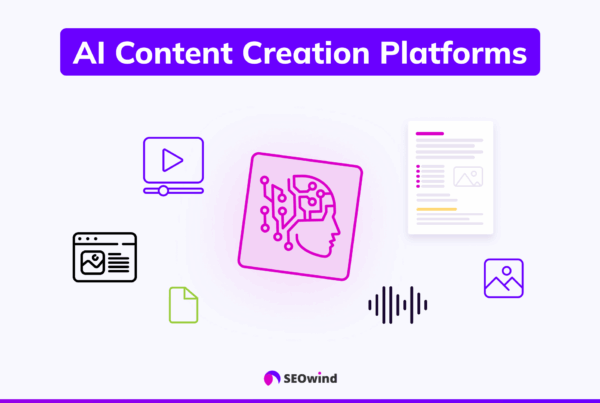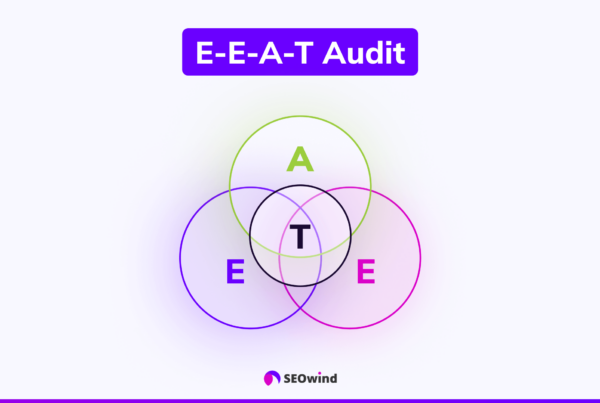Content creation has hit a major turning point. The old-school marketing playbook can no longer keep up with what people expect today, and artificial intelligence has become the secret weapon that’s transforming how brands think about creating, sharing, and enhancing their content. An AI content strategy isn’t just about automating tasks. It’s about building a smart system that combines human creativity with machine intelligence to achieve results that were previously impossible.
The numbers speak for themselves. In 2024, 69.1% of marketers have incorporated AI into their marketing strategies, up from 61.4% in 2023 (Influencer Marketing Hub). This isn’t just a passing fad. It’s a complete shift in how winning brands approach content marketing. B2B marketers are increasingly embracing this change, with 81% using generative AI tools compared to 72% the previous year.
The real question isn’t whether AI will change content strategy; it’s whether it has already done so. It’s how fast companies can adapt to take advantage of what it offers.
What is AI Content Strategy?
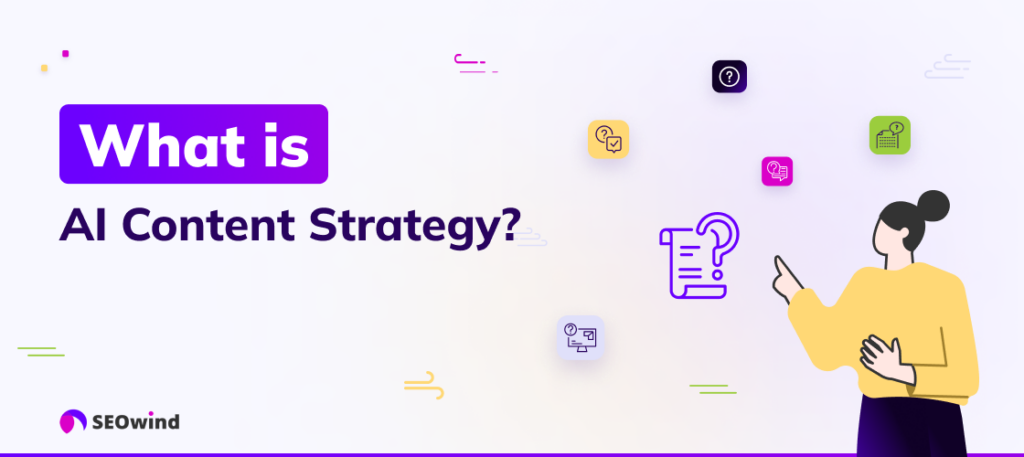
AI content strategy is a smart way to plan, create, share, and analyze content using artificial intelligence tools. Instead of traditional methods that rely heavily on manual processes and intuition, AI-powered strategies utilize machine learning, natural language processing, and predictive analytics to make informed, data-driven decisions throughout your entire content creation process.
What makes this approach so powerful is that it functions as an intelligent system, handling mundane and repetitive tasks while enhancing human creativity and strategic thinking. This partnership between AI and human expertise, rather than replacement, enables people to leverage their knowledge, experience, and strategic insights. At the same time, AI provides the efficiency, data crunching, and processing speed that would be impossible to achieve manually.
As Andy Crestodina from Orbit Media Studios puts it, “AI isn’t just about writing faster. It’s about making your content smarter. The real winners are those who combine human creativity with machine insights to create genuinely useful resources.”
The technology is fantastic at analyzing vast amounts of data to understand what your audience likes, predict how content will perform, and personalize experiences based on user behavior. However, making it work successfully requires more than just purchasing AI tools. You need a strategic approach that sets clear goals, understands the various types of AI technology available, and creates workflows that maximize the benefits of both humans and machines.
Today’s AI content strategy covers everything from AI-powered keyword research and content creation to automated distribution and performance tweaking. The goal extends far beyond mere automation. It’s about creating a comprehensive system that enhances every aspect of content marketing while preserving the authentic voice and strategic direction that only human insight can provide.
Benefits of AI Content Strategy
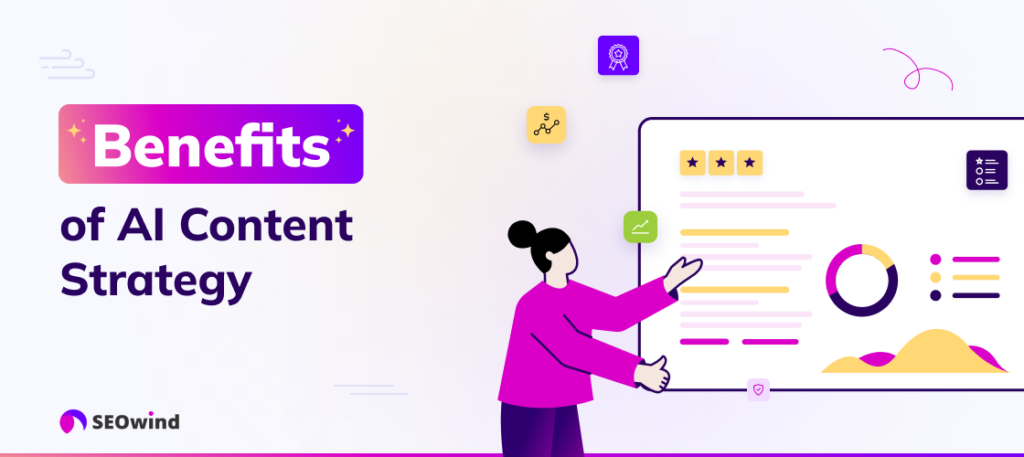
The global AI marketing market reached $47.32 billion in 2025 (Statista) and continues to grow rapidly, with significant adoption among enterprise marketing teams (57% in 2024). This explosive growth demonstrates the significant value businesses are deriving from AI-powered marketing solutions.
Improved Efficiency and Faster Campaigns
The efficiency and performance boost from implementing AI content strategy are both vast and measurable. Recent data from All About AI show that AI-driven campaigns achieve 47% higher click-through rates (2.80% versus 1.91% for traditional campaigns) while reducing the cost per acquisition by 29% ($27.26 compared to $38.40). What’s truly impressive is the speed advantage. AI enables campaigns to launch 75% faster, allowing marketers to execute campaigns in days instead of weeks.
Skyrocketing Engagement and Retention
The engagement impact tells a more compelling story. Companies using AI-powered content strategies report 175% higher customer engagement rates and 31% better customer retention compared to traditional methods.
Lead Generation on Steroids
For lead generation, content marketing powered by AI generates 3x as many leads as outbound methods at a 62% lower cost.
Time Savings for Marketers
Currently, 43% of marketers using AI tools apply them specifically for content creation, while 86% report that AI saves them over an hour each day when developing creative content ideas(HubSpot State of AI Report 2024). This time savings directly translates into better productivity and the ability to focus on bigger-picture strategic work.
Precision Targeting with Data
AI technologies are excellent at processing complex audience data to create highly targeted content experiences. Advanced algorithms can analyze user behavior patterns, engagement history, and demographic information to deliver personalized content that truly resonates with specific audience groups. This level of precise targeting was previously impossible with traditional content marketing approaches and represents one of the biggest advantages of AI-powered strategies.
Consistency at Scale
One of the most compelling benefits is AI’s ability to maintain consistent quality across a vast amount of content. AI tools can ensure your brand’s voice remains consistent, optimize content readability, and maintain SEO standards while producing content at scale. This consistency becomes especially valuable for organizations managing multiple content channels and campaigns at once.
Predictive Power for Smarter Strategy
The most game-changing aspect is AI’s predictive analytics power. By analyzing past performance data, trending topics, and engagement patterns, AI systems can predict future content opportunities and potential problems. This proactive approach enables marketers to stay ahead of trends and make strategic adjustments before competitors identify emerging opportunities.
Components of an AI Content Strategy
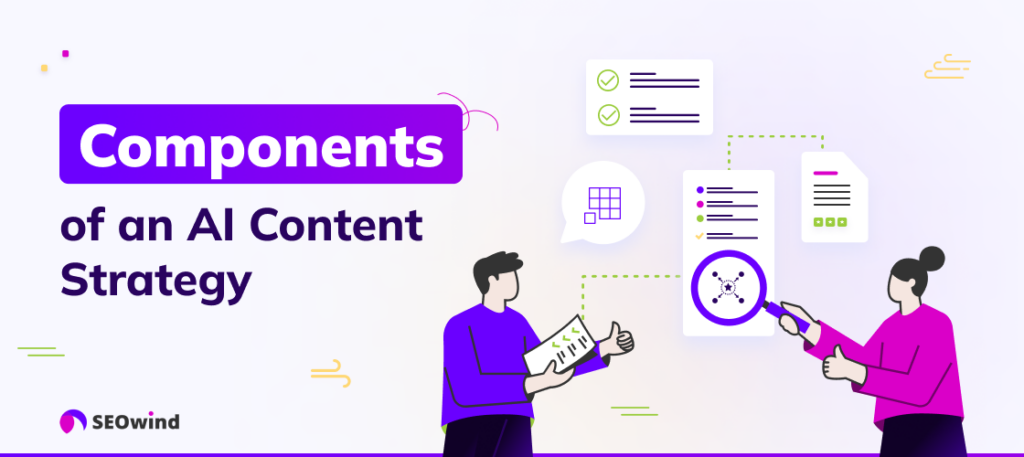
Strategic Goal Setting and Objective Definition
Success in AI automation depends on having clear objectives and defining the tasks you want to automate. Before implementing any AI tools, set specific, measurable goals that align with your bigger business objectives. Whether you’re trying to boost engagement rates, improve search rankings, or enhance customer retention, these defined outcomes give direction to every decision you make in your AI content strategy.
AI lets you scale ideation, production, and promotion, but the marketers who win are those who add strategic human insight at every step.” Tom Winter, Founder of SEOwind
Advanced Audience Analysis and Targeting
Modern AI tools are great at creating detailed audience personas through comprehensive data analysis. By examining user behavior patterns, demographic information, engagement history, and preference indicators, AI systems can identify micro-segments within your audience that human analysis might miss. This detailed understanding enables you to create highly targeted content that speaks directly to the specific needs and interests of your audience.
AI-Powered Keyword Research and SEO Strategy
Effective keyword research using AI goes way beyond simple volume and competition metrics. Advanced AI tools can spot semantic relationships, predict emerging trends, and understand search intent patterns that inform both content creation and optimization strategies. This includes analyzing long-tail keyword opportunities, monitoring competitor keyword strategies, and regularly updating keyword lists based on changing search behaviors.
Good survival instincts would dictate the use of these tactics:
- Employing long-tail keywords for more specialized searches
- Monitoring competitor keyword strategies to understand the market better
- Regularly updating keyword lists based on evolving, technology-driven data.
Content Creation Using AI Tools
The heart of any AI content strategy is using artificial intelligence for content creation while keeping human oversight and creativity. AI tools can generate blog posts, social media content, email campaigns, and other marketing materials that maintain brand voice and incorporate strategic messaging. However, successful AI content creation requires proper prompting techniques, providing relevant context and research, and understanding that AI serves as a logical engine that needs data to make effective decisions.
Content Optimization and Enhancement
AI-powered content optimization involves utilizing machine learning algorithms to enhance readability, SEO performance, and the potential for engagement. These tools can analyze content structure, suggest improvements, and make sure each piece aligns with both search engine requirements and user preferences. The optimization process should be ongoing, with AI tools continuously analyzing performance data to suggest improvements.
Intelligent Content Distribution
AI algorithms can determine the optimal timing, channels, and messaging for content distribution based on audience behavior patterns and engagement data. This includes automating social media posting schedules, personalizing email campaigns, and selecting the most effective channels for reaching specific audience segments.
Personalization at Scale
One of AI’s greatest strengths in content strategy is its ability to create personalized experiences for large audiences. By analyzing individual user journeys, preferences, and interaction histories, AI can tailor content recommendations, email sequences, and website experiences to match each user’s specific needs and interests. Research shows that 96% of marketers report that personalized brand experience boosts sales (HubSpot). In comparison, 82% of customers feel more positive about brands after engaging with custom content (Demand Metric).
Step-by-Step AI Content Strategy Implementation Guide

Phase 1: Foundation and Assessment
Begin by conducting a comprehensive audit of your current content strategy to identify areas where AI can have the most significant impact. This involves analyzing existing content performance, identifying repetitive tasks that can be automated, and establishing baseline metrics to measure the success of AI implementation.
Before automating any process, it’s smart to manually perform tasks first. I often name it as “human as a service” (HaaS). This way you understand the process, identify potential problems, and recognize edge cases. This step helps define what “good” looks like and what shouldn’t be automated.
Phase 2: Tool Selection and Integration
Understanding the different types of AI tools is crucial for successful implementation. Large Language Models (LLMs), in their basic form, function like chatbots for simple conversations, while GPTs are more specialized LLMs trained for specific tasks and can incorporate additional documents or instructions.
AI Workflows are linear processes that follow predefined paths to solve specific problems or complete repetitive, structured tasks, offering good predictability. AI Agents, on the other hand, are designed to solve open-ended questions or complex problems without predefined solution paths, having access to various tools and creating resolution paths dynamically.
Phase 3: Content Creation Workflow Development
Implement a systematic approach to AI content creation, utilizing a recommended 7-step process: AI Research, AI Brief Creation, AI Research (Again), AI Draft, AI Review and Critique, Internal Linking and SEO Optimization, and Final Human Edit.
The critique stage, where one AI evaluates the output of another AI or human, is crucial for refining content quality before publication. This multi-step approach ensures that AI-generated content meets quality standards while maintaining efficiency gains.
Phase 4: Testing and Optimization
Establish continuous testing protocols to evaluate AI content performance against traditional methods. This includes A/B testing AI-generated content variations, monitoring engagement metrics, and refining AI prompts and workflows based on performance data.

Measuring AI Content Strategy Success

Key Performance Indicators for AI Content
Measuring the success of AI content strategies requires a comprehensive approach that goes beyond traditional metrics. The top five KPIs recommended by marketing experts for tracking AI content strategy success include:
User Intent Fulfillment measures how well your content answers user questions directly within search engine results, such as snippets, AI summaries, or voice responses. Success in this area shows that you’re providing value at the earliest touchpoints and building trust before users even visit your site.
Search Visibility and Share of SERP tracks how often your brand or content appears in valuable real estate on search results pages, including featured snippets, People Also Ask sections, knowledge panels, and AI-generated summaries. The focus is on owning as much relevant visibility as possible, not just achieving standard organic rankings.
Real Engagement Metrics go beyond traditional bounce rates to assess deep engagement through time on page, scroll depth, return visits, comments, and shares. High engagement signals to both search engines and your team that content resonates and provides genuine value.
Brand Mentions and Digital Sentiment measure how often your brand is mentioned across the web and the tone of those mentions, including forums, reviews, and third-party sites. Positive sentiment and frequent mentions contribute to building entity authority and trust with both algorithms and audiences.
AI Interaction Metrics focuses on how your content is accessed and utilized by AI systems themselves, including being referenced, summarized, or answered by AI agents such as voice assistants or AI-powered search tools.
AI-Powered Content Creation Tools
AI-powered tools have emerged as game-changers. They fall within those categories:
AI Writers
AI content writing tools are revolutionizing the way we create content. These sophisticated tools can generate articles, blog posts, and even marketing copy with minimal human input. They use natural language processing and machine learning algorithms to produce coherent, engaging text that often rivals human-written content.
AI Audio and Video Editors
AI is not just limited to text. Audio and video editing tools powered by AI are making complex editing tasks more accessible to creators of all skill levels. These tools can automatically remove background noise, enhance audio quality, and even suggest edits based on content analysis.
AI Video Generation Platforms
Perhaps one of the most exciting developments is in AI video generation. These platforms can create entire videos from text inputs, including selecting appropriate visuals, adding animations, and even generating voiceovers. This technology is particularly valuable for businesses looking to scale their video content production efficiently.
AI Tools for Content Strategy
HubSpot – AI-Powered Content Strategy
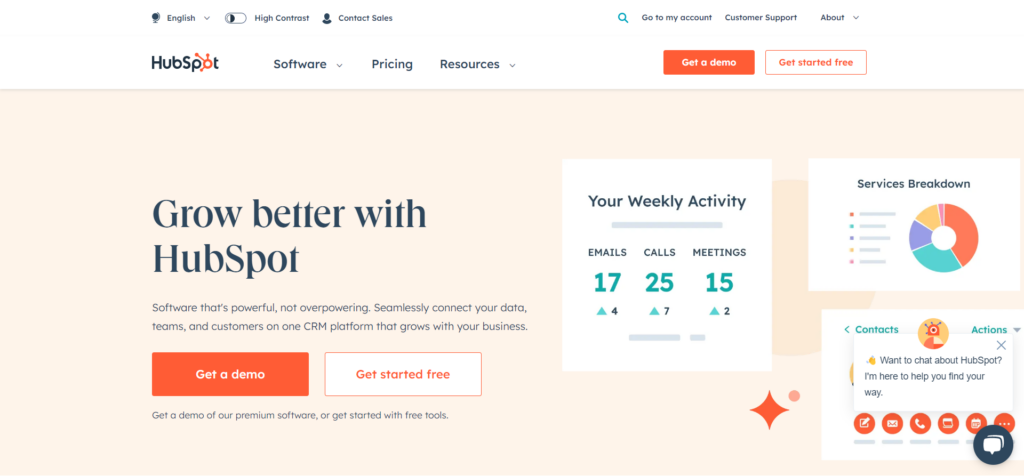
First, we have HubSpot, a well-known name within the marketing community. HubSpot offers an integrated approach to AI-powered content strategy, combining content creation capabilities with comprehensive analytics and customer relationship management. The platform uses AI to analyze audience behavior, predict content performance, and personalize customer experiences across multiple touchpoints. Its machine learning algorithms can figure out which topics resonate most with your audience and optimize email sequences based on individual customer behavior patterns.
SEOwind – AI Article Writing and Content Updates
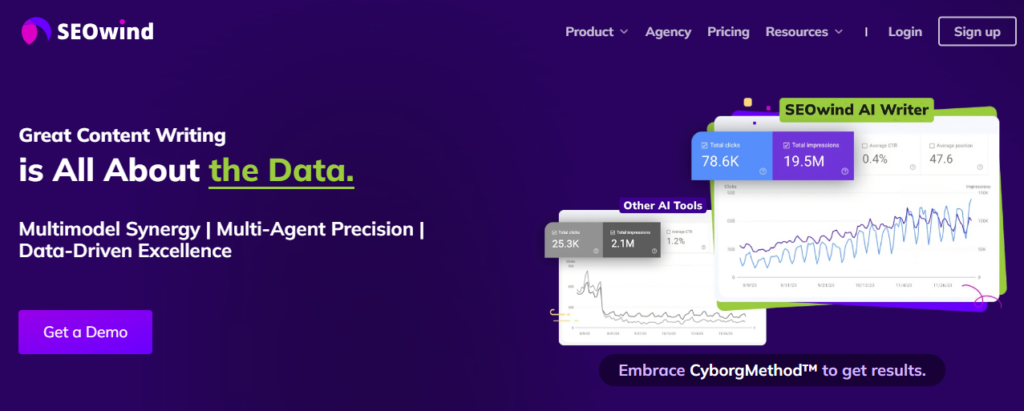
SEOwind tackles one of the most critical challenges in content strategy: creating search engine-optimized content that ranks well and drives organic traffic. The platform’s AI Writer feature automatically generates unique, SEO-friendly content based on comprehensive keyword research and competitor analysis. Rather than spending hours manually crafting keyword-optimized articles or hiring expensive copywriters, SEOwind streamlines the entire process while maintaining high-quality and readable standards.

Descript – AI Audio and Video Editor

Descript revolutionizes multimedia content creation by using AI transcription services to convert spoken words into editable text, making audio and video editing as simple as working with a Word document. This innovation removes traditional barriers to creating high-quality podcasts and videos, essential components of modern content strategies.
The landscape of AI video generation platforms continues to expand, with tools that can create entire videos from text inputs, including the selection of appropriate visuals, the addition of animation, and the generation of voiceovers. These platforms prove particularly valuable for businesses looking to scale video content production efficiently without significant resource investment.
MarketMuse – AI Content Planning and Optimization
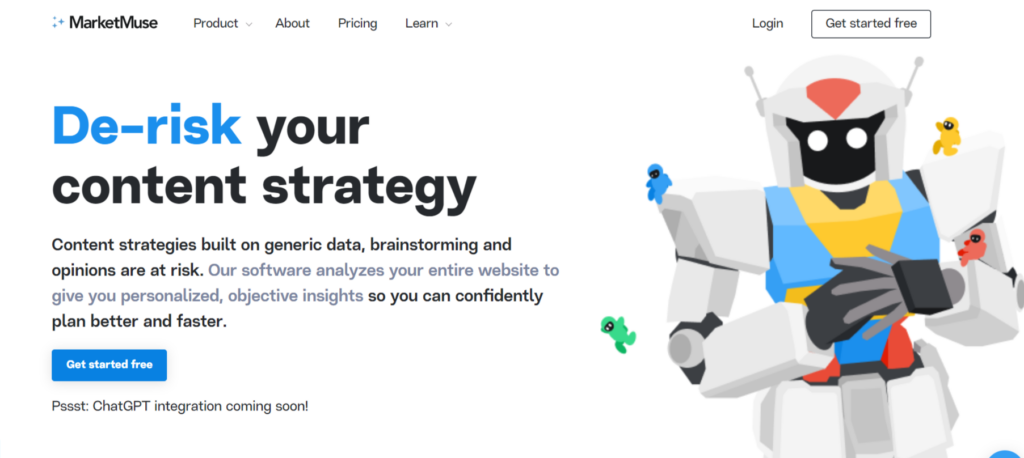
MarketMuse focuses specifically on content planning and optimization, utilizing artificial intelligence to align content with audience information needs, thereby helping achieve higher search rankings than competitors. Through its semantic analysis capabilities, MarketMuse’s AI identifies opportunities for subject-matter authority that humans and traditional SEO tools might overlook, ensuring comprehensive topic coverage that genuinely aligns with reader intent.
Grammarly – AI Writing Assistant
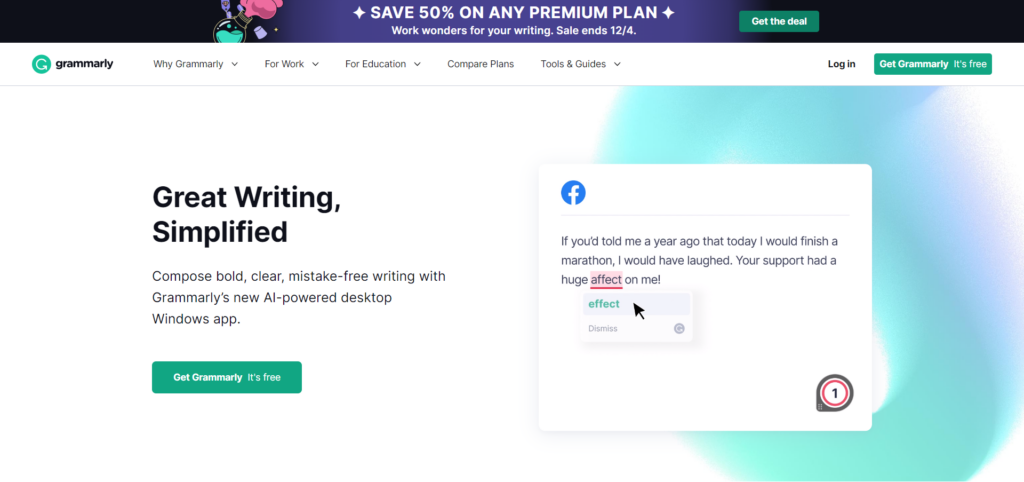
Grammarly works as an AI-powered writing assistant that elevates content quality through advanced grammar checking, style improvements, and tone optimization. Beyond catching common grammatical errors, Grammarly reviews stylistic elements like tone infusion, identifies redundant phrases, and suggests alternative word choices more suitable for specific message delivery goals.
Future Trends and Emerging Technologies
Advanced Human-AI Collaboration
The future of AI content strategy will likely feature even smoother integration between human creativity and artificial intelligence capabilities. This evolution will focus on AI tools that better understand context, emotion, and strategic nuance. At the same time, humans develop new skills in AI management and prompt engineering.
Enhanced Personalization Capabilities
Emerging AI technologies will enable even more sophisticated personalization, moving beyond demographic targeting to real-time behavioral adaptation and predictive content delivery. These advances will allow content strategies to anticipate user needs and deliver relevant information before users even realize they need it.
Integration with Emerging Platforms
As new content platforms and formats emerge, AI content strategies will need to adapt quickly to leverage opportunities across voice search, augmented reality, and other emerging channels. The ability to rapidly adapt content for new formats and platforms will become a significant competitive advantage.
Best Practices for an Effective AI Content Strategy
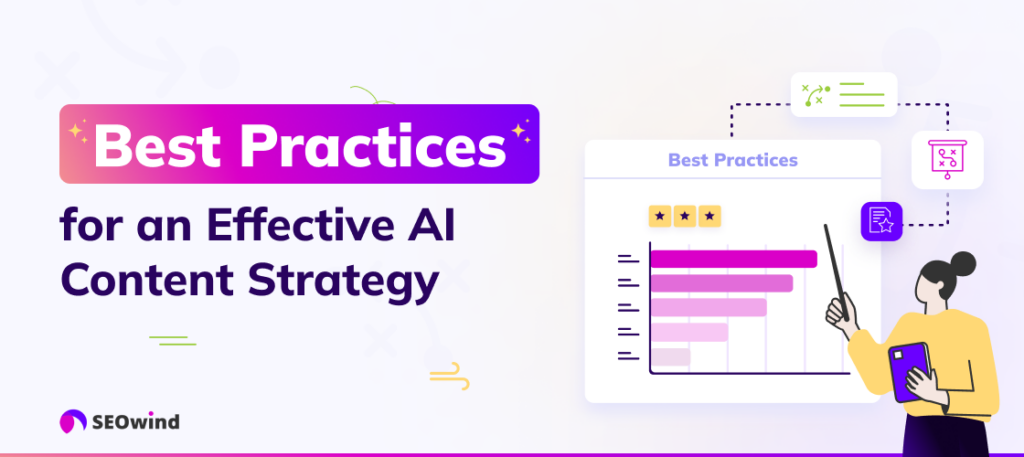
Incorporating AI into your business content strategy is like embarking on a mighty voyage. Fortunately, you can rely on state-of-the-art best practices, which make the difference between sailing smoothly into thriving online visibility and getting lost in the vast sea of digital content.
Set clear, measurable objectives
One key strategy is setting clear, measurable objectives to guide your AI content strategy. “Where do I want my audience engagement numbers to be in three months?” “What kind of increase am I looking for in site traffic?” These kinds of specific questions can help set a smooth course.
Undertake analytical audience targeting
Next, undertake analytical audience targeting by constructing detailed audience personas. Imagine them as islands in your target ocean. Every detail helps you chart a more accurate map. Enhance these personas with actual data about your users’ behavior, demographic information, and interests.
Incorporate comprehensive keyword research as part of the navigational toolkit for this online expedition. Use AI-powered tools to identify relevant keywords as well as related semantic phrases and questions, amplifying the magnetic pull towards your content shores.
Create visual content with AI
Embrace AI-powered content creation. Advanced algorithms can write robust narratives or create compelling visuals. They are like waves propelling your boat toward ambitious marketing horizons at blazing speed.
Use AI platforms to analyze elements like word choice, readability level, and SEO metadata and proactively optimize content. It’s akin to fine-tuning your sails to catch the most beneficial gusts of wind.
Curate content intelligently
Curate intelligently through automated curation methods that scan multiple online sources and distribute them meaningfully across diverse consumer touch points. In the same way a lighthouse illuminates dark shores for vessels navigating at night, AI can shine a light on essential but obscured pieces, boosting online visibility significantly.
Utilize personalization
There’s no denying that a personal take draws people to a chosen topic. So, you should utilize personalization with every piece of content. An AI system that thoroughly understands user preferences can provide tailor-made experiences, making consumers feel seen and valued. Think of this like an anchor strengthening their connection with your brand.
Predict trends
Lastly, remember that predictive analytics is your compass. Leverage AI tools to predict trends based on data patterns and user behavior. Like land sightings hint at nearing shorelines, such insights give you a notion of where your future lies, guiding timely business decisions.
Embracing these concepts bridges the gap between complex technology and human sensibilities in an effective AI content strategy. Happy sailing!
Common Questions on AI Content Strategy

As AI content strategy is the field that is still developing, beginners often have a lot of queries on how to handle it. Here, we’d like to tackle one frequently asked question.
What is the difference between Content Strategy and AI-powered Content Strategy?
Traditional content strategy relies heavily on manual market research, content creation, and performance analysis. This approach involves human teams conducting audience research, crafting brand messaging, creating content, and analyzing performance data through traditional analytics tools.
AI-powered content strategy enhances these traditional processes through automation, data analysis, and predictive capabilities that would be impossible to achieve manually. The key differences lie in three areas: labor-saving efficiency through automation of routine tasks like keyword research and analytics report generation, data-powered precision through intelligent algorithms that process large data volumes quickly to make predictions and decisions based on actionable insights, and hyper-personalization capabilities that understand individual customer behavior patterns and preferences to create tailored communications.
While both approaches aim to create effective audience communication, AI-powered strategies enable more granular data interpretation and precisely targeted content strategies, leading to improved engagement outcomes and measurable business results.
